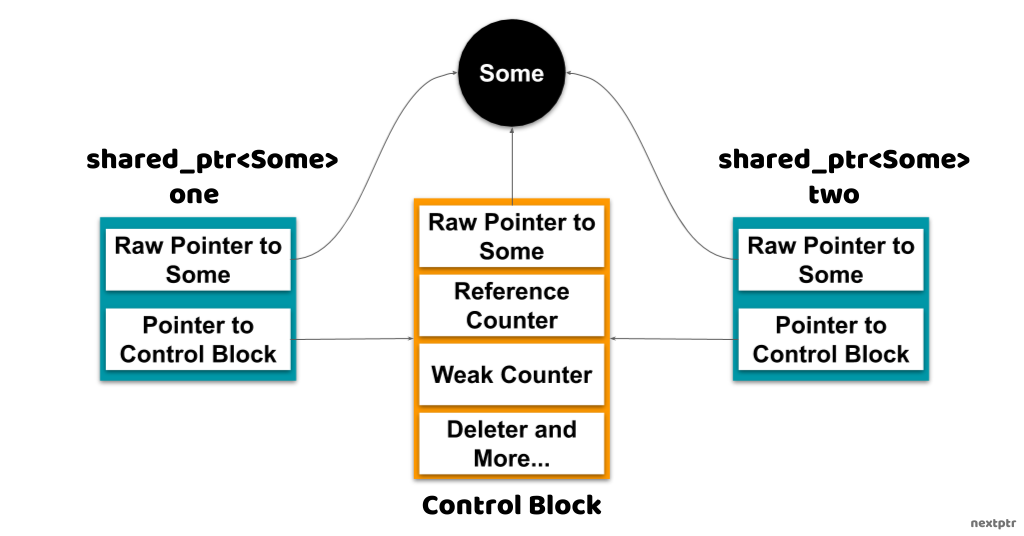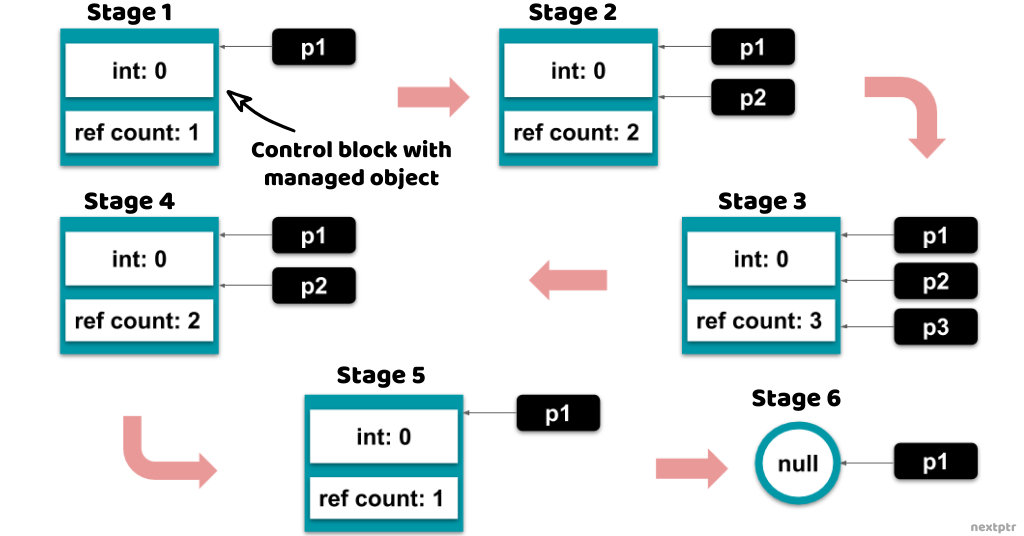
An introduction to shared_ptr's basics and internals through examples.
Tutorial | Mar 21, 2020 | hkumarThe C++11 std::shared_ptr is a shared ownership smart pointer type. Several shared_ptr instances can share the management of an object's lifetime through a common control block. The managed object is deleted when the last owning shared_ptr is destroyed (or is made to point to another object). Memory management by shared_ptr is deterministic because the timing of a managed object's destruction is predictable and in the developer's control. Hence, std::shared_ptr brings deterministic automatic memory management to C++, without the overhead of garbage collection. Here is a basic example of shared_ptr:
//some struct struct Some < int x; >; void useless(std::shared_ptr p) < //Change the underlying object p->x = 20; > void spam() < //Create/initialize shared_ptrauto one = std::shared_ptr(new Some()); //Another shared_ptr pointing nowhere std::shared_ptr two; //Change the underlying object one->x = 10; //Read through shared_ptr std::cout x << "\n"; //x: 10 //Pass to a function by value. This increases the ref count. useless(one); //Underlying object is changed std::cout x This article is specific to general usage and internals of shared_ptr. It does not cover the fundamentals of smart pointers and assumes that the reader is familiar with those. Having looked at the basic usage, let's move on to the internals of shared_ptr that make it work.
In a typical implementation, a shared_ptr contains only two pointers: a raw pointer to the managed object that is returned by get(), and a pointer to the control block. A shared_ptr control block at least includes a pointer to the managed object or the object itself, a reference counter, and a weak counter. And depending on how a shared_ptr is initialized, the control block can also contain other data, most notably, a deleter and an allocator. The following figure corresponds to the example in the previous section. It shows the conceptual memory layout of the two shared_ptr instances managing the object:

Next, we talk about the details of the most relevant parts of the control block. You would see that the memory layout of shared_ptr can deviate from the above illustration depending on how it is constructed.
A control block contains a pointer to the managed object, which is used for deleting the object. One interesting fact is that the managed pointer in the control block could be different in type (and even value) from the raw pointer in the shared_ptr. This leads to a few fascinating use cases. In the following example, the types of the raw pointer and the managed pointer are different, but they are compatible and have the same values:
//A shared_ptr managing an int //The raw pointer is void* auto vp = std::shared_ptr(new int()); //OK //However, we can't do much with 'vp' //Another example //Inheritance with no virtual destructor struct A < //stuff.. ~A() < std::cout //not virtual >; struct B : A < //stuff.. ~B() < std::cout //not virtual >; //shared_ptr managing a B object //raw pointer is A* and managed pointer is B* auto pa = std::shared_ptr(new B()); //OK pa.reset(); //Calls B's destructor The inheritance example above is rather contrived. It shows that despite the destructor being not virtual, the correct derived class (B) destructor is invoked when the base class (A) shared_ptr is reset. That works because the control block is destroying the object through B*, not through the raw pointer A*. Nevertheless, the destructor should be declared virtual in the classes that are meant to be used polymorphically. This example intends to merely show how a shared_ptr works.
There is an even more exotic aliasing constructor of shared_ptr that can initialize a shared_ptr from a raw pointer and an unrelated shared_ptr. Consequently, an aliasing constructor can produce a shared_ptr that shares the management of one object but points to another object (usually a subobject of the managed object). For instance:
struct Yolk < >; struct White < >; struct Egg < White w; Yolk y; >; auto ep = std::shared_ptr(new Egg()); //Aliasing constructor to construct shared_ptr //yp shares ownership with ep but points to subobject ep->y auto yp = std::shared_ptr(ep, &ep->y); The in-depth treatment of aliasing constructor deserves its own space. I encourage you to check out "Aliasing constructed shared_ptr as key of map or set" for a more persuasive use case.
There is more discussion about the managed object pointer in the 'Deleter' section below when we talk about the type erasure.
Before we delve into more intricate details, let's talk about the std::make_shared. We mentioned above that the control block could either contain a pointer to the managed object or the object itself. The control block is dynamically allocated. Constructing the managed object in-place within the control block can avoid the two separate memory allocations for the object and the control block, resulting in an uncomplicated control block and better performance. The std::make_shared is a preferred way to construct a shared_ptr because it builds the managed object within the control block:
auto sp = std::make_shared("Hello"); //Creates the std::string in the control block std::cout The reference counter, which is incremented and decremented atomically, tracks the number of owning shared_ptr instances. The reference count increases as a new shared_ptr is constructed, and it decreases as an owning shared_ptr is destroyed. One exception to that is the reference count is left unchanged when a shared_ptr is moved because the move-constructor transfers the ownership from the source to the newly constructed shared_ptr. The managed object is disposed of when the reference count reaches zero.
std::shared_ptr ownership is also affected by the copy and move assignment operators. The copy assignment operator decreases the reference count of the destination (LHS) shared_ptr and increases the reference count of the source (RHS) shared_ptr. Whereas, the move assignment operator decreases the reference count of the destination (LHS) but does not change the reference count of the source (RHS).
Let's explore another example that exhibits the lifecycle of an object managed by a few shared_ptr instances. As you go through the code, refer the following figure for the different stages:
void baz(std::shared_ptr p3) < //Stage 3 std::cout int main() < //Create a shared_ptrauto p1 = std::make_shared(0); //Stage 1 std::cout //Stage 5 std::cout 
A control block also keeps the count of weak_ptr associated with it in a weak counter. An std::weak_ptr is a smart pointer that serves as a weak reference to an std::shared_ptr managed object. When a weak_ptr is created from a shared_ptr, it refers to the same control block but does not share the ownership of the managed object. It is not possible to directly access the managed object through a weak_ptr. A weak_ptr must be copied to a shared_ptr to acquire access to the managed object.
The following multithreaded example shows how a shared_ptr can be created from a weak_ptr as long as the managed object is alive. A reader thread periodically tries to acquire a shared_ptr from a weak_ptr and logs the value. If the reader thread cannot acquire a shared_ptr in an iteration, it exits. A writer thread periodically changes the shared_ptr managed std::atomic_int value a few times and exits. When the writer thread exits, the shared_ptr held by it is destroyed, and the reader thread can no longer get a shared_ptr from its weak_ptr, which makes the reader thread to also exit. The program terminates when both the threads exit:
int main() < auto sp = std::shared_ptr(new std::atomic_int()); //Reader //A weak_ptr is created and captured (syntax requires requires c++14). std::thread r([wp = std::weak_ptr(sp)]() < //weak_ptr created. ref count: 1, weak count: 1 while(true) < //Acquire a shared_ptr through lock() if(auto p = wp.lock()) < //shared_ptr acquired. ref count is 1 or 2 std::cout else < //shared_ptr could not be acquired. ref count 0 break; >//sleep std::this_thread::sleep_for(std::chrono::seconds(1)); > >); //Writer //The shared_ptr is moved and captured so the ref count stays 1 //If the shared_ptr is copied instead of moved, this program will never // end because the reader would never exit (try that!). //Move in capture clause requires c++14 std::thread w([mp = std::move(sp)]() < //shared_ptr moved. ref count: 1 for(int i=1; i>); //Join the threads. w.join(); r.join(); return 0; > The weak count is the number of existing weak_ptr. The weak count does not play any role in deciding the lifetime of the managed object, which is deleted when the reference count reaches zero. However, the control block itself is not deleted until the weak count also reaches zero.
When a shared_ptr is initialized with a pointer, its control block contains a deleter function object (or function pointer), which is invoked to destroy the managed object. If a custom deleter is not provided to the shared_ptr constructor, a default deleter (e.g., std::default_delete) is used that calls the delete operator.
The deleter is type-erased for two reasons. First, a deleter is an optional argument to a shared_ptr constructor, not a template parameter. Hence, a shared_ptr's type is deleter agnostic. Second, a deleter is a function object (or a function pointer), e.g., function . This indirection makes shared_ptr independent of the details of how the managed object is deleted. This loose-coupling of shared_ptr with the deleter makes it quite flexible. For instance, in the example below, a vector> can be in its compilation unit entirely oblivious to the knowledge of how an incomplete type T is deleted:
//A compilation unit class Thing; //only declaration. 'Thing' is incomplete here. void foo(std::shared_ptr thing) < std::vector vec; vec.push_back(thing); > //+------------------- + ---------------------------+ //Different compilation unit struct Thing < //stuff.. >; void foo(std::shared_ptr); int main() < //Default deleter foo(std::shared_ptr(new Thing())); //Custom lambda deleter foo(std::shared_ptr(new Thing(), [](Thing* p) < delete p; >)); > The control block itself is allocated by an allocator that must satisfy the Allocator requirements. When a custom allocator is not provided, the std::allocator is used that dynamically allocates the control block. The control block keeps a copy of the allocator, which is type-erased like the deleter. There are two ways to use a custom allocator. One is to provide a custom allocator when initializing the shared_ptr with a managed object pointer, as shown below. Note that this shared_ptr constructor also requires a deleter:
struct SomeData < >; //Allocator must be defined auto sp = std::shared_ptr(new SomeData(), std::default_delete(), Allocator()); Another way to use a custom allocator is to utilize std::allocate_shared that can construct the managed object in-place within a custom allocated control block. Therefore, the std::allocate_shared is like std::make_shared, except that it takes a custom allocator:
auto sp = std::allocate_shared(Allocator()); The std::shared_ptr is a handy yet straightforward utility. But under its simplicity lie extensive details that make it work. Dereferencing a shared_ptr is nearly as fast as a raw pointer, but constructing or copying a shared_ptr is certainly more expensive. Nonetheless, for most applications, this cost is reasonable for automatic memory management.